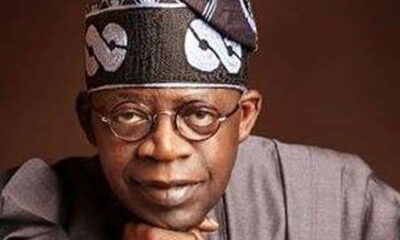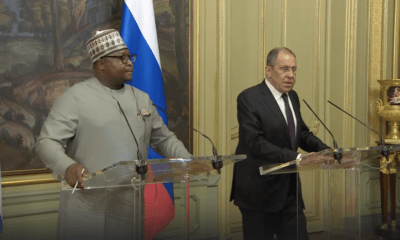Economic Issues
Nigeria May Become Poorer By Unwisely Following IMF And World Bank Policies -By Festus Tokunbo
The IMF and World Bank have promoted policies over the years that have led to the radical declined of the Nigerian currency against western currencies while the Naira still maintains sustainable values with some of Nigerian top trading partners like China and India. The economic implication of this is that Nigeria can achieve currency stability and economic sustainability by trading exclusively in Asian currencies. The medium-term solution to address the Nigerian currency crisis is initiating currency swaps with its top trading partners while the long-term solution is the local production of goods and services.

A Dutch Professor once told me; “the history of humanity is a history of exploitation of all kinds”. I have found this to be true and don’t expect any changes in decades. The under-development of Nigeria can partly be blamed on imperial policies of the west promoted through institutions such as the IMF and World Bank, in addition to the corrupt practices of the country’s political system. Nigeria is potentially, one of the richest countries in the world in terms of humans, minerals and ecological resources, but the development policies of the west promoted through institutions such as the IMF and World Bank, political corruption and weak institution have hindered the country from achieving its dominant potentials. “A leopard doesn’t change its skin”. In summer 2021, I challenged an IMF official at Jaume University in Spain that the institution may need structural reform to maintains its functions as a global financialsurveillance, citing the example of some of East Asians countries that now prefer loans fromthe Chinese government or AsianInfrastructural InvestmentBank to the IMF loans when those countries are experiencing payment imbalances. In response, the IMF official who was the chief speaker at the event said the Asian countries prefer Chinese loans to IMF loans due to China’s geopolitical influence on the Asian continent. But that’s far from the truth, because after the experience of the East Asians Economic Crisis in 1997, some of the East Asians countries have adopted capital control and are less interested in the IMF and World Bank loans due to its market conditionalities that weaken macroeconomic variables of the borrowing countries. The IMF loans erode monetary policy autonomy of the borrowing country and also attract a high cost of servicing. UNICEF recentlyargued that the cost of servicing external debt in most low-income countries exceeds government expenditures on health, education and social services. The IMF and World Bank loans are also becoming unsustainable due to the aggressive monetary policies in the United States that is leading to the surging of the US dollar. Whenever the US adjusts its interest rates, the consequence of such a policy is the cost of refinancing existing debt would be on the increase for low-income countries. That’s why the fastest growing economies since the end of the 2nd World War have pursued a different economic model than that of the World and IMF.
It came to happen that countries that have adopted other economic and fiscal policies other than that of the IMF and World Banks recommendations have achieved transitions from low-income to upper middle-income countries and are now the newly-industrialised economies. Since its formation in 1945, the IMF has promoted politics that weaken the currencies of low-income countries and de-industrialised their economics. IMF has also promoted policies structured on market conditionality’s, strengthened transnational actors and weakens national institutions. Since about 40 years ago, the IMF and World Bank projects havebeen highly concentrated in Latin America, Africa and South Asia. Today, those regions are the poorest in the world because the IMF and World Bank policies have not improved their macroeconomic nor socioeconomics variables. The Bretton wood institutions have constantly promoted dollarization polices and maintain that the Nigerian currency is over-valued, which has led to the CBN constantly devaluing the naira since the 1990s. The Nigerian currency has depreciated from N198 to $1 when the APC government of President Buhari unseated the PDP in 2015 to about N1000 to $1 today. The APC government borrowed more from the IMF and World in 9 years than the total amount that the PDP governments borrowed in its 16yrs administration. The devaluation of the naira has crippled the Nigerians’ purchasing power,worsening the consumer-price index and increased monetary poverty in Nigeria. President Tinubu has also continued in the path of his predecessor by borrowing majorly from the IMF and World Bank for consumption.If this path continues, the Nigerian currency may depreciate to N2000 for 1$ by 2024 and lead to an increase in the monetary poverty index in the country. Rather than increasing the Nigerian debt stock, the government should promote policies that increase internally-generated revenue. President Tinubu should set a good example by radically reducing the cost of governance; begin with the executive arm, which may influence other arms of government to reduce the cost of governance. In its 2023 World Economic outlook, the IMF and World Bank have advised that Nigeria adjust its interest rate,which today stands at 18.75%. The 18.75% interest rate would hinder local production of goods and services, hinder the ability of the country to address the currency crisis and monetary poverty. The interest rates in some African countries are among the highest in the world. Imposing high-interest rates on low-income countries is like creating more poverty in those countries. In the European Zone, the interest rate is 4.5%;it is 5.3% in the UK and 5.5% in the US. The interest rate in South Africa is about 8.25%. To address monetary poverty in Nigeria, the interest rate must be less than 10%. To achieve this, the government must improve its internally-generated revenue, reduce international borrowing to achieve monetary policy autonomy, reduce government spending on recurrent expenditure and engage capital control to achieve fiscal sustainability.
Nigeria must de-dollarize the economy to address its monetary poverty.
From the macroeconomic interplay of the last 20 years in low-income countries, there seems to be a linear relation between dollarization and monetary poverty. No governments in developing countries have addressed poverty nor stimulated economic growth since the end of the Second World War in 1945 without promoting de-dollarization policies. The Former Finance Minister, after her 20 years’ experience with the World Bank believed Nigeria cannot achieve monetary stability without de-dollarization and initiated the currency swap between China and Nigeria. The succeeding governments after Owealla have refused to fully implement the swap policy. In a recent interview, the famous human rights lawyer, Femi Fallana said CBN intelligence told him the IMF instructed the former CBN governor, Emefielle to stop the implementation of the currency swap between Nigeria and China. Mr Emefielle was so unwise to have listened to the IMF and abandoned such a smart monetary policy. I cannot imagine the IMF instructing the South African government or any of the New-industrialised countries to abandon de-dollarization policies that would strengthen their local currencies and stabilise the macroeconomics. Nigeria will need to revisit its currency swap with China and also initiate the Nigerian-Indian currency swap to de-dollarize the economy, strengthen the naira and address monetary poverty. The IMF and World Bank have promoted policies over the years that have led to the radical declined of the Nigerian currency against western currencies while the Naira still maintains sustainable values with some of Nigerian top trading partners like China and India. The economic implication of this is that Nigeria can achieve currency stability and economic sustainability by trading exclusively in Asian currencies. The medium-term solution to address the Nigerian currency crisis is initiating currency swaps with its top trading partners while the long-term solution is the local production of goods and services.
Strong national institution will promote policies that improve government revenue and address poverty;
The Nigerian political institution is among the weakest in Sub-Saharan Africa despite its huge economic, human and ecological potentials. The newly industrialised countries maintain a balanced relationship with IMF and World Bank. South Africa has a stronger and independent political institution than Nigeria in foreign policies and that has reflected in the country’s economic growth. The IMF and World Bank will not dictate to the South African government nor will the institution succeed in promoting wrongheaded policies to the country. Nigeria has been a victim of western imperial policies perpetrated by the IMF and World Bank since her independence in 1960 due to weak institutions. That’s why the country failed to fully explore carbon development to achieve energy security that would have stimulated local industrialisation and economic growth, despite its huge reserves of carbon resources like coal, uranium, nuclear and other fossil fuels. South Africa, on other hand fully explored the carbon-age towards economic development. The country currently generates about 59,000 megawatts for its 61 million population. In its energy transition plan, South Africa intends to transit majorly through the adoption of natural gas and nuclear energy because those energy resources are more sustainable for the Sub-Sahara African countries than the solar and wind energy being promoted by the IMF, World Bank and western governments. The Nigerian Nationally Determined contribution to climate change may cause millions of Nigerians to experience monetary and energy poverty in their lifetime because the climate change objective is western imposed and does not suite Nigeria’s socioeconomic realities.President Tinubu led administration must be independent of the institutions such as the IMF and World Bank in policy making and promote policies that suites the Nigerian socio-economic reality. I am impressed with President Tinibu’s Minister of Women Affair for threatening the United Nations with legal suite for inappropriate financial practices with Nigeria. The ability to maintain balanced relations with institutions such as the UN, IMF and World Bank is critical to Nigeria achieving a transition from poverty to prosperity and achieving economic dominant.
Festus Tokunbo.
Nottingham Trent University, UK.
International Development & Climate Change Analyst.
Email; festus.ayomipo2022@my.ntu.ac.uk



















